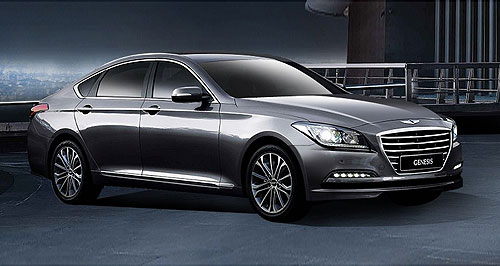Make / Model Search
News - General News - GovernmentKorea free trade pact to protect Ford, Holden, ToyotaBuffer zone: A landmark free trade agreement between Australia and South Korea should help local car-makers maximise returns for vehicles such as the diesel-engined Ford Territory. Tariffs on big-engined cars to stay until Australian automotive manufacturing ends17 Feb 2014 By BARRY PARK UPDATED: 18/02/2014A PROPOSED free trade agreement thrashed out with South Korea will help protect Australian car-makers as they prepare to quit Australian manufacturing by the end of 2017. Federal trade minister Andrew Robb yesterday released the full text of the agreement with the east Asian nation, revealing protective tariffs will remain in place on large-engined cars – the staples of Australian manufacturing – for up to the next five years. The agreement also seems to set the framework for a less painful exit of Ford, Holden and Toyota, ensuring that the three car-makers will be able to maximise returns before shutting down their Australian car-making operations – Ford in 2016, and the other two by the end of 2017. Mr Robb revealed yesterday that the tariffs, which will extend to large petrol-engined cars for three years past the agreement’s ratification, and to large diesel-engined cars for up to five years, were aimed at protecting local car-makers. “It's (the tariffs extended to imported Korean cars) more to do with engine size,” he said in response to a question about the types of vehicles that the proposed agreement would impact on. “So all the V8 models, some of the larger six-cylinder vehicles, they (the tariffs) phase out over three years.” Mr Robb said the timings for withdrawing tariffs on certain engine sizes and fuel types were intended to create a buffer between local car-makers and those in South Korea. “It's a sensitivity associated with the ability to compete in those areas – the Territory, for instance, is a vehicle that is produced here, is finding it difficult to compete in some of those markets, and that's why we've phased it out over three years,” he said. Holden said the proposed free trade agreement would result in “overall upside for the business”. “Holden imports several car models and various parts from Korea and exports engines from our Port Melbourne plant,” Holden corporate communications manager Sean Poppitt said. “While we have only just started analysing the details of the FTA, our first look suggests that it will be good for our business. Mr Poppitt said Holden had taken part in some talks between the Department of Foreign Affairs and Trade and the Australian automotive industry, but was not involved in direct negotiations. Hyundai Australia public relations general manager Bill Thomas told GoAuto the slower phase-out on tariffs for large-engined cars would not affect the roll-out of its V6-engined Genesis sedan, due late this year. Mr Thomas said the Genesis, with its 3.8-litre V6, would be Hyundai’s only model to be negatively impacted by the free trade agreement. “Genesis will be the only large petrol-engined car we do of any description,” he said. “It will be affected by this because there’s no doubt it has a large petrol engine.”“It (maintaining tariffs on large-engined cars) is just another factor in doing business in this country,” Mr Thomas said. He said Hyundai Australia – along with the Korean car-maker’s North American division, had not yet even started discussing pricing for the car. South Korean car-makers are struggling with similar problems to those that have beset Australia’s three remaining assembly businesses, including a strengthening currency, rising wage costs, and cheaper manufacturing environments in the US and Japan. Mr Thomas said the effect on the other cars in Hyundai's Australian showrooms would also be difficult to assess. “We still haven’t worked out how it (the free trade agreement) is going to affect our day-to-day business,” he said. “We’re not coming out and saying there will be a direct benefit (for small-engined cars) on list price, because we’re dealing with all sorts of variables.” Meanwhile, car buyers expecting a keen bargain once a free trade agreement between Australia and South Korea is signed may end up disappointed, with prices expected to remain steady once it is introduced. Kia Australia general manager of public relations Kevin Hepworth said the Korean car brand had not yet even started talking about the implications of the agreement, as the formalisation of the pact was still too far away. However, he said lifting the current five percent tariff on Korean cars imported to Australia did not necessarily mean they would become cheaper. “There’s no guarantees that there will be a price reduction (once the tariff falls) because there are other ways to add value to the car such as specification upgrades and currency adjustments if the value of the Australian dollar fluctuates,” he said. “It’s just still too far out and too vague and unformed to be making any decisions on that.” Meanwhile, Australian car parts-makers will benefit immediately from the removal of an eight percent tariff on components exporter from Australia to Korea. “Australian automotive manufacturers exported $93 million of gearboxes (for which Korea is Australia’s largest market) and $53 million of engines and engine parts to Korea in 2012-13,” the Department of Foreign Affairs and Trade said in a statement explaining the terms of the pact.  Read more |
Click to shareGeneral News articlesResearch General News Motor industry news |












Facebook Twitter Instagram